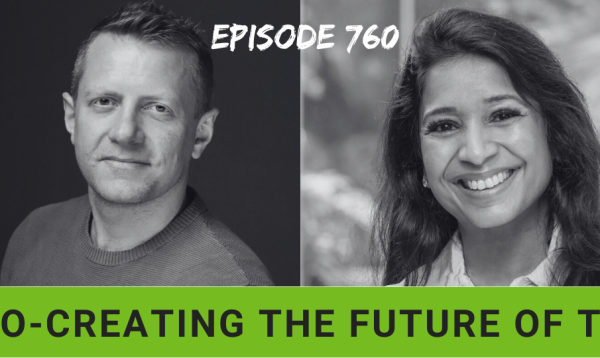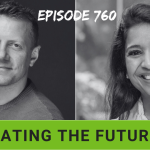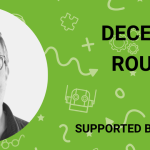Company culture is a fundamental selling point for attracting the right talent to an organization. However, in many cases, it is talked about in a cliched, inauthentic way during the hiring process. Culture is also often portrayed in terms of the working environment or via specific perks rather than being something that holistically represents the organization.
So, how can TA teams use culture as a genuine magnet to attract talent in a post-pandemic world where work has fundamentally changed?
My guest this week is Kirstie Eustace, Chief Admin Officer at Steward Partners. Steward Partners is an excellent example of an organization that puts their culture front and centre in there hiring process, and Kirstie has some excellent insights and advice to share
In the interview, we discuss:
• The definition of culture in a corporate context
• How does culture translate into employee and candidate experience?
• Prioritising wellbeing
• Using culture to stand out in talent acquisition
• Storytelling with real examples
• Giving candidates direct access to existing employees and the leadership team
• The role of technology
• What does the future look like
Follow this podcast on Apple Podcasts.
Follow this podcast on Spotify.
Matt Alder [00:00:00]:
Support for this podcast comes from smart recruiters. Are you looking to supercharge your hiring? Meet Winston Smart Recruiter’s AI Powered Companion. I’ve had a demo of Winston. The capabilities are extremely powerful and it’s been crafted to elevate hiring to a whole new level. This AI sidekick goes beyond the usual assistant handling all the time consuming admin work so you can focus on connecting with top talent and making better hiring decisions. From screening candidates to scheduling interviews, Winston manages it all with AI precision, keeping the hiring process fast, smart and effective. Head over to smartrecruiters.com and see how Winston can deliver superhuman results.
Matt Alder [00:01:05]:
Hi there. Welcome to episode 655 of Recruiting Future with me. Matt Alder. Company culture is a fundamental selling point for attracting the right talent to an organization. However, in lots of cases it’s talked about in a cliched, inauthentic way during the hiring process. Not only that, culture is often portrayed in terms of working environment or via specific perks rather than being something that holistically represents the organization. So how, in the post pandemic world where work has fundamentally changed, can TA teams use culture as a genuine magnet to attract talent? My guest this week is Kirstie Eustace, Chief Admin Officer at Steward Partners. Steward Partners are a great example of an organization who puts their culture front and centre in their hiring process and Kirstie has some excellent insights and advice to share. Hi Kirstie and welcome to the podcast.
Kirstie Eustace [00:02:08]:
Hey Matt, thank you so much for having me.
Matt Alder [00:02:10]:
An absolute pleasure to have you on the show. Please could you introduce yourself and tell everyone what you do?
Kirstie Eustace [00:02:16]:
Absolutely. So my name is Kirstie Eustace. I’m currently the Chief Administrative Officer of a firm called Steward Partners. Stuart Partners is an employ owned wealth management firm and we have our own broker, dealer and advisory platform. And what we do is we provide infrastructure and services for financial advisors who want to take a path to being independent, which basically means they want to have a more sort of entrepreneurial direction of their business, run their own entity and we provide them with infrastructure to support that. It’s actually a new role for me. Until just very recently I was the firm’s chief HR officer and I’ve been in HR for 25 years now. I still actually lead HR as part of the response responsibilities in my new role and I oversee strategic HR initiatives, talent management, talent acquisition and organizational culture. And really making sure that what we’re doing is aligning all of our practices, our policies, the programs to make sure that we’re consistent with what we set out to achieve with regards to our culture, but obviously staying consistent with the overall strategic goals and business direction.
Matt Alder [00:03:21]:
So let’s zoom in on culture specifically. What’s your definition of culture in a corporate context and how important is it?
Kirstie Eustace [00:03:30]:
So I still actually subscribe to the fairly traditional definition of culture in that corporate context, being that it is something that at its core, it’s really about those shared set of values, the beliefs, you know, importantly how behaviors shape an organization and how it functions. And that includes how you make a decision, how people interact with each other, and really underpinning how people feel about working there. But I think the way, I certainly believe the way we think about culture and how you create it has and necessarily so evolved over time. And it can really be more than about that traditional definition. And culture is critical. It directly impacts everything that you have going on in an organization, from employee engagement, how productive people are being, how well you’re able to attract and retain that talent. And that strong culture is critical to make sure that everybody is actually aligned towards a common goal, that they’re fostering that sense that they belong to something. They have that shared sense of being in the same car, going in the same direction. People have always, but even more so now, want to be in a place of belonging. They want to be in a place of something that feels bigger than just themselves, that they’re contributing to that, and the culture provides that connection. When they can be part of something, they’re more likely to take ownership of their work, they’re more likely to collaborate more effectively. And ultimately what we’re all looking for is, is that long term success.
Matt Alder [00:05:03]:
How have you sort of developed that culture? Because you could think that actually culture is when people come together and you know, very much the way that people work together kind of defines culture and things like that. So, you know, what control do you have over it? How has it developed? How are you? How are you shaping it?
Kirstie Eustace [00:05:21]:
So I recognize that my firm is very fortunate. We’re relatively young, we’re about 10 or so years old, actually, I think 11 years old now. So we don’t have as long a history of some other organizations that may have been established over a period, a long period of time, of decades in fact. But the difference for our firm, and I do think this is still possible for any other organization. So Stuart Partners was incredibly intentional about its culture from the Very first day, it wasn’t going to sort of come to a place and say, okay, now let’s stop and think about who we are, and does that make sense for us? It set out from day one to say, this is a partnership. We want everybody to feel as if they are in this together. And in order to support that, we’re going to create ownership. And that really underscores that. So in our organization, everybody’s an equity partner. Everybody has little piece of ownership of the firm. So our culture was built on pillars of partnership and ownership, and those really create the foundational values upon which everything else is really built. And when we think about that concept of partnership, it’s really just not a label. It really drives how we think, how we operate, how we work with one another. We make decisions as owners. We make decisions understanding that we are all sort of locked arms together, partners in this journey. And that was really intentional from the very beginning, because as our financial advisors were sort of taking this path towards independence and sort of breaking new ground, we wanted to be very intentional about the fact that you’re not on your own here. We’re going to help you do this. We’re going to sort of lock arms and do it. And ever since the very beginning, our leadership has taken great care in sort of clearly articulating who we are, not just what we do, but who we are and what we stand for. And that drives where we’re heading as well. So it’s one. The culture that we’ve built is one of deep intentionality to make sure that we are thinking about those pillars of core values. But on top of that, how can we create openness, transparency? This is everybody’s firm. We’re all part of it. So how can we make sure people have access to sort of good information? How can we be inclusive to make sure that you have an opportunity to have a voice? Your feedback counts. When you tell us something and you give us a new idea, are we nimble enough and adaptable enough to actually change, pivot, and take a different direction? So it’s one thing to say that you sort of have a culture. It’s very different to sort of really live it and embody it. And I think that really has been successful for us because we’ve been intentional from the very start, and I suppose.
Matt Alder [00:07:54]:
Give us some more kind of practicalities around that. How does it translate into things like employee experience and wellbeing? You know, how are people kind of experiencing the culture as it was?
Kirstie Eustace [00:08:04]:
It’s really about us making sure People feel valued and supported. So we talked about that transparency of communication. We want to make sure that everybody understands how their roles contribute towards that sort of broader firm goal. It’s very important for people to, when I think about their experience, when I think about their sort of overall well being, you know, somebody is sort of aimlessly in a direction that they have no idea what they’re doing, why they’re doing it and how they’re contributing. I think that can be an incredibly stressful and demotivating place to be. So we really want to make sure that they understand what they’re part of. And that starts all the way back from sort of when we’re going through an onboarding sort of process and experience and how we get them sort of integrated. But really what I think about in terms of that sort of wellbeing side of things is we’ve created an environment where wellbeing is prioritized because of that feeling connected to something bigger. You’re naturally more invested in sort of maintaining that balance and well being for other people. And you know, we have great role models across our senior leadership team. A lot of us have come from larger organizations and they’re phenomenal places to be in larger organizations. But when you make a pivot to a smaller organization, you have much more flexibility. And we have great people with really, really good values that want to do the right thing by people. And so where they may have in the past had some barriers to entry to doing the right thing by the people that they know best, their team members, we give them the freedom and the flexibility to sort make those decisions. And people feel very empowered across the organization that they actually know that they can do the right thing, they can support people. So we see very localized decisions and of course it has to operate within an appropriate framework, but we see very localized decisions that are made for people that are absolutely right for the people at the place and time that they need them.
Matt Alder [00:10:02]:
Are you able to give any examples of those or of that kind of thing in general?
Kirstie Eustace [00:10:06]:
Yeah, I mean, it’s maybe it’s a little morbid, but at one point we were talking about, you know, well, the firm have a bereavement policy and there are certain rules and such that you have to follow depending on sort of where you’re based in the U.S. but you know, the resounding feeling was, well, how do you ever prescribe how many days you should be allowed to grieve somebody? You know, why would we do that? Why would we, why wouldn’t we do the right thing for somebody. And why wouldn’t we make sure that we take care of who they are and where they are? You know, you can’t prescribe for or, you know, if you’ve got a family member that’s one up, one down, one sideways, like a mother, brother, sister, child, you know, how can that be ascribed in a policy where in actual fact, you’ve got, you know, an incredibly close friend or other relative that really is going to create a much more meaningful impact in their passing and they live across the other side of the country. Go do what you need to do. Let’s not worry about sort of having to be so prescriptive.
Matt Alder [00:11:31]:
From a talent acquisition perspective. Because you, you know, you mentioned at the start that that’s still part of your kind of overall remit. What part does culture play in that? So how do you get across your culture, make people believe that that’s, that’s kind of what actually happens, kind of build that trust within the, you know, the talent acquisition hiring process.
Kirstie Eustace [00:11:58]:
Culture is really our ability to set ourselves apart as an organization. And we are very intentional, once again, about making sure potential hires understand what it means to be a steward partner. So during our interview process, we set a very, very clear picture of the values, particularly what it means to be an owner and what it means to be a part of a partnership. And we really want candidates to self select into that culture. And we’re very candid, we’re very honest about saying, listen, this might not be the place that everyone can thrive, but if these are the things that you seek, if these are the experiences that you seek, this is somewhere that you can come and be extremely successful. And we do a lot of storytelling. We sort of leverage being able to share sort of real examples from current employees, how things have been able to impact their careers, and we use those partners. This is everybody’s firm, so everybody’s invested in making sure that the talent comes into the firm and is the right people to sort of continue to serve this organization and push it forward. And we really say to people, hey, listen, you’ve got the website. Go call anybody. Go call every person on that website, however many people you want to call and talk to them about, you know, what it means to Be here, go and call the members of our board of directors. Really, we want you to understand who it is and you should pick up the phone to anybody and feel free to call them. So we want people to truly understand what it means. We have no illusions that, you know, working in a sort of small startup type environment is necessarily for everybody. But what I will say is that, you know, most, very much most of the time and only when it doesn’t is because I haven’t spoken to those people yet. But everybody comes back to me and says, Kirsty is exactly what you said. And you know what, you weren’t making this up. It’s better than I thought it was going to be. So that’s a good indication that we are doing what we set out to do is to be incredibly transparent.
Matt Alder [00:13:57]:
No, absolutely, absolutely. And I’m going to ask you this question because I sort of ask everyone this question and I’m so genuinely interested in how it might be in a nature enabler here. But what role does technology play in all of this?
Kirstie Eustace [00:14:09]:
Technology, I think I know, has a critical role to play, but only so far as that it supports facilitating the culture. It can never take the place of it. Technology is a tool, not a solution. And I would think about back to when we first sort of stepped into the COVID pandemic and we never would have been able to continue functioning without the connectivity that we got through Zoom or teams. And we never would have been able to maintain that collaborative approach or be connected. And I think the way in which that has been able to translate today has been tremendous. It’s given us a ton more flexibility. It supported a major shift in the way this workforce engages in a short period of time that we don’t think we ever would have seen before. So I think it’s critical to leverage technology as a tool. But I think in some ways we’re actually more connected than we used to be in that. That’s a very good thing. But I would say sometimes I long for a good old fashioned conference call where I can fold some washing and I don’t always have to worry about being on the screen. So, you know, some of these platforms that I see, you know, that tout or you know, say that they’re going to sort of, you know, solve all the employee engagement issues. I’m particularly wary about it because if technology is overused, I think it can create isolation. It, it could actually be unnecessarily complicated to people or in fact a barrier. So I’m still a firm believer that there’s no substitute for the human connection when you come together. And those subtle personal interactions, those sharing of experiences, when you form sort of those bonds, you can’t replicate that through screens or platforms. And leaders really have their priority as creating that sense of culture by being able to be authentic in that human interaction. Vital tool, because I think you can use it in so many effective way, but we always have to balance it against turning it into something that’s transactional versus relational. And I do still fundamentally believe that culture is, is relational.
Matt Alder [00:16:17]:
No, absolutely. And you, you sort of mentioned Covid there. And I know for, you know, for many organizations, their, their culture seemed to be very much based around, you know, where they were physically and what they did physically together and all those, all those kind of things. Things. How do you flex when those unexpected things happen? How do you sort of make sure that your culture and your approach to culture is relevant and resonating in such a fast changing world?
Kirstie Eustace [00:16:44]:
I mean, the pandemic tested everybody’s adaptability and it really was actually a highlight of the strength of our culture. And look, Covid was a test of epic proportions. But when you come to a company that’s sort of rapidly growing, you are necessarily going to continuously experience things, things that are new or unexpected, particularly when you’re growing. And we’ve had a number of those experiences in dealing with those sort of circumstances. Obviously nothing of the COVID scale, but we went through that too. And flexibility is really key. We obviously went through the whole adaptation of a new way of working remote, working safety protocols, how do teams collaborate and so on and so forth. But what it also opened up for us was a phenomenal opportunity to access talent on a national basis. So across the US we were able to access phenomenal talent. And what we really had to do as we were sort of going through that process was to be very thoughtful about helping people feel and understand that they were connected still to something that at its core was about partnership and about coming together. So I think the way in which we did this was the, you know, we just kept coming back to those core values. You know, partnership, we’re going to get through this together. Ownership, we’re doing this so we can all share in the success. And what we found was if you could keep coming back to at least those things which you could be consistent, you can build that trust. And that trust gives you that chance to sort of continue to make evolution and changes. And the way that we sort of really leaned into sort of our culture through that was sort of, you know, making sure everybody continued to remember about the fact that they’re owners. And it’s not about what’s a company doing for you, it’s, you know, how are you sharing your perspective, your feedback, your ideas. Let’s change together. We’re very, very aware that great ideas come from across the firm. It’s wonderful to be able to sort of reach across to multiple people in different states with different ages and stages and backgrounds and everything else and be open to hearing about things that could work better or differently and being nimble enough to sort of adapt to that and provide those individuals with a platform to share some of that information or best practices. So in actual fact, I think it can be a. I think it can. And honestly, in many, many ways for us, it was a really positive experience to actually not just sort of, you know, test our culture, but really embed who we were into each and every person, because we all went through that shared experience.
Matt Alder [00:19:17]:
Absolutely. And as a final question, what does the future look like? What do you want things to look like in three years time?
Kirstie Eustace [00:19:25]:
So I think starting sort of a little bit more local in the way I see our organization growth is really going to be the name of the game. It has been sort of consist for the last 10, 11 years and it’s going to continue to be that. And you know, what my hope is for our future is that we really can stay true to the tenets of what got us to where we are. There are many things in which you have to adapt and change. What got you to where you are is not necessarily what’s going to get you to the next phase, but there are some things that I think culture being one of them, that you really should sort of maintain the consistency. So my hope, and as I look forward down the line is that we can continue to grow as rapidly as we are, but we can continue to make sure that people feel connected to sort of why we even came together to form an organization in the first place. That growth’s undoubtedly going to bring new challenges, but it’s going to be that opportunity to continue to come back and test our resilience against our culture, make sure that it still stands firm, and then see opportunities to sort of change and evolve. So I really hope that that somebody who joins from today to 3 years time, to 5 years time is going to still have the same sort of experience of sensing a sense of partnership ownership, what they’ve joined in to and what they are now coming to be part of. And I think as we sort of move forward on a more general basis over the next few years. I really do believe that we can’t put that toothpaste back in the tube. We’ve set ourselves off on a path of people really seeking and demanding a new set of expectations from their workplace, be it whether it’s flexibility, whether it’s the opportunity to sort of show up and contribute in ways that don’t sort of look like they did traditionally. And I really do hope that we continue to, as HR professionals and beyond, I think we really have a role to play to make sure that we are keeping our leaders sort of open to understanding that contributions can come in so many different ways and shapes and forms. And we got to get really, I think, flexible in terms of how we actually adapt to that and accept that. Because what got this is where what got us to where we are is not what’s going to get us to where we’re going in the future. And I think that’s what people have to be open up to.
Matt Alder [00:21:48]:
Kirstie, thank you very much for talking to me.
Kirstie Eustace [00:21:50]:
Thank you, Matt.
Matt Alder [00:21:52]:
My thanks to Kirstie. You can follow this podcast on Apple Podcasts on Spotify or via your podcasting app of choice. You can search all the past episodes at recruitingfuture.com on that site. You can also subscribe to our weekly newsletter, Recruiting Future Feast, and get the inside track about everything that’s coming up on the show. Thanks very much for listening. I’ll be back next time and I hope you’ll join me.








